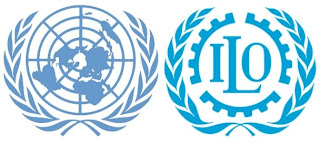The Philippines is the Chairman for the UN International Labor Organization (ILO) who finalized last year, ratified to come into force by 2013
NEW YORK, Sept 6, (UN News Center): A United Nations treaty which provides a set of international standards to improve the lives of millions of domestic workers worldwide has now been ratified by a second Member State, the Philippines, allowing it to come into force by 2013.
The Convention on Domestic Workers, that seeks to protect domestic workers around the world, the Department of Foreign Affairs (DFA) said which states that workers around the world who care for families and households must have the same basic labor rights as other employees, was adopted at the annual conference of the UN International Labor Organization (ILO) last year in Geneva.
To enter into force, however, the Convention required ratification by two countries. In June, Uruguay became the first country to ratify it.
The Philippines is the second country after Uruguay to ratify the measure, a move seen as a "significant milestone in the protection of migrant domestic workers," the Philippine Department of Foreign Affairs (DFA) said.
Protected
"Today's ratification by the Philippines sends a powerful signal to the millions of domestic workers who will be protected when the Convention comes into force," said ILO's Director-General, Juan So-mavia. "I hope it will also send a signal to other Member States and that we will soon see more and more countries committing to protect the rights of domestic workers."
Ambassador Evan Garcia, the country's permanent representative to the United Nations in Geneva, on Wednesday formalized the Philippines' ratification of the International Labor Organization (ILO) Convention 189, or the Convention on Decent Work for Domestic Workers.
More than 150,000 Filipinos work as household help in different parts of the world, particularly the Middle East, Europe and North America which sets to be phase out by 2015 which means the move for the Philippines it not focuses for the welfare for Filipino Domestic Workers but to all the Domestic Workers around the world.
There are around 53 million domestic workers worldwide but experts put the total number at 100 million as this kind of work is often unregistered, according to recent ILO estimates.
The ILO convention seeks to provide equal protection to domestic workers, assuring decent pay, work conditions and other benefits.
The convention stipulates standards that would ensure that domestic workers are treated with "the same respect, dignity and protection given to other workers," Hernandez said.
Recent ILO estimates based on national surveys or censuses in 117 countries place the number of domestic workers at a minimum of 53 million, but experts say there could be as many as 100 million across the world.
In developing countries, they make up at least four to 12 percent of those in wage employment, and around 83 per cent of them are women, many of whom are migrant workers.
"The new standard covers all domestic workers and provides for special measures to protect those workers who, because of their young age or nationality or live-in status, may be exposed to additional risks," ILO said in a news release.
The Convention also states that domestic workers must have the rights to reasonable working hours, weekly rest of at least 24 consecutive hours, a limit on in-kind payments and clear information on terms and conditions of their employment, as well as the right to freedom of association and collective bargaining.
The Philippine Congress, meanwhile, is discussing various pending measures that would implement the Convention's provisions in the country.
The ILO said the treaty would extend standards to a group which continues to be poorly regulated and remains largely part of the informal sector.
The convention lists basic rights for domestic workers, including reasonable working hours, weekly rest of at least 24 consecutive hours, a limit on in-kind payment, clear information on terms and conditions of employment, and respect for fundamental principles and rights at work, including freedom of association and the right to collective bargaining.
The convention, finalized last year by an ILO committee that the Philippine labor department chaired, will come into force in the Philippines by 2013, the DFA said.
President Aquino signed the convention's ratification earlier this year.
On August 6, the Senate approved on third reading the resolution concurring the ratification of the convention with 20 votes.
In a statement, Somavia said the Philippine ratification of the treaty "sends a powerful signal to the millions of domestic workers who will be protected when the convention comes into force."
Somavia said he was hoping to see more and more countries committing to protect the rights of domestic workers.
So far, No major migrant-receiving country, however, has ratified the convention, noted Migrante International, an organization of overseas Filipino workers.












